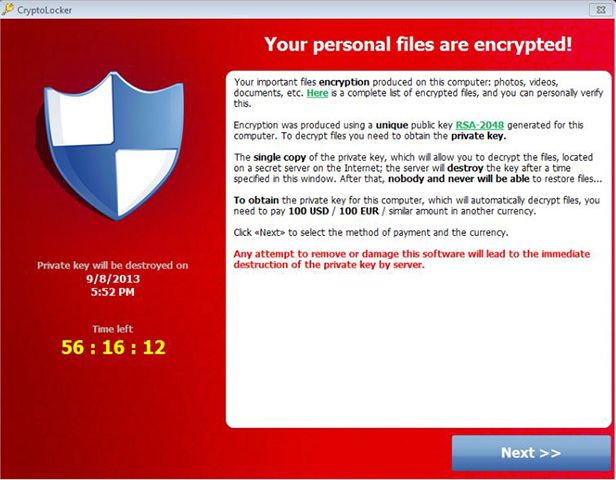If you don’t know it, Ransomware is a type of malware that “steals” the information on your hard drive by encrypting it and threatened to completely erase it with no possibility of recovery if you don’t pay to unlock it. In recent weeks one such program, called Cryptolocker, has begun to spread from the United Kingdom. I know what you’re thinking: How can you keep yourself safe?
The way it works is as simple as it is dangerous: it infects your computer when you run some sort of malicious code that poses as a legitimate file, either an email attachment or some other type of source, and takes advantage of security gaps in out-of-date software installed on your machine. What does that mean? Well, that you need to be careful with the files you’re opening and make sure you keep your operating system, as well as your security software, up-to-date.
If you’ve been infected, a window like the one below will pop up and advise you that many of the local files on your machine have been encrypted, with the only means of recovering them being to make a payment to the “captors” through a variety of different payment methods. That said, no matter how much of a ransom they want in exchange for the supposed “rescue” of your information, there’s no guarantee that you’ll actually be able to recover your files if you pay it anyway, meaning that it’s much better to prevent than try to cure.

The program locks the files on your machine that are in formats like .JPG, .DOC, .XLS, and other types that are likely to contain personal information. In Spain there was recently a similar outbreak with the so-called “police virus” that pressured people to pay a fine for having visited some supposedly illegal webpage. The difference in this case is that Cryptolocker actually can delete your information.
Although there are no specific ways to delete this malware if you find yourself affected by it, there are softwares to keep you from getting it in the first place, such as the program Anti Ransom. The company Bitfender has announced that at the end of October more than 10,000 computers were infected in the United States, and also offered its own application to prevent data encryptions. Some highly compromising cases have already come to light: the Massachusetts police saw its systems affected and had to pay more than $1,300 to be able to recover its information.
Even still, we repeat, the best way to protect yourself is to use common sense and verify the source of every single file you open.






